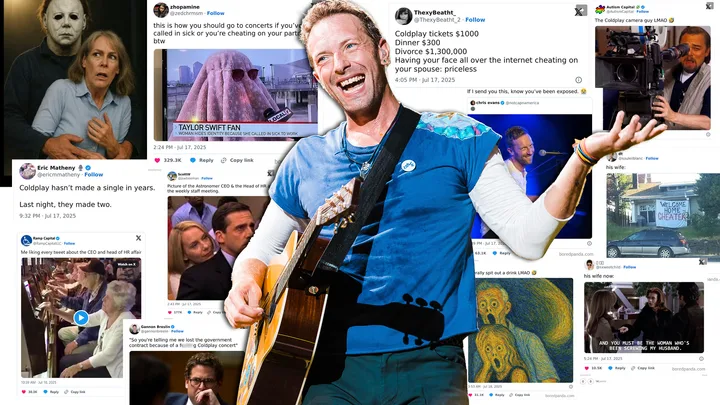For 24 hours, I laughed too. I’ll admit it. The cheating scandal. The Coldplay concert. The astronomer CEO diving to the floor. The TikTok memes. The on-stage cutaways. The group chat dissection. It was the perfect storm of internet: all sex and scandal.
And then, I felt it – that ick. The kind that creeps up when a joke crosses into spectacle. The moment something funny becomes… gross.
Let’s backtrack.
In case you missed it (or live under a WiFi-proof rock), here’s the short version. A man and woman—allegedly having an affair—were caught kissing on the Coldplay concert kiss cam. The twist? He was the CEO of tech company Astronomer (emphasis on was – he’s since resigned), and she was his head of HR. Cue: a viral corporate scandal caught on camera.
TikTok did what TikTok does, it tore it into a million viral pieces. Cue the memes. Cue the brand tweets. It was pure meme gold. Until it wasn’t. At some point, we collectively forgot that this wasn’t a reality show or a scripted viral stunt – it was real life. With real consequences. With real people. And most importantly: real kids.
Yep. There are kids involved. Four of them, to be exact. Kids who now have to Google their Mum and Dad and see them all over the Internet. Who have to sit in class while classmates laugh over memes featuring their family. Who will be processing this – online and IRL – for years. Suddenly, it all feels very cruel.
People cheat. It happens every day. In cheap hotel rooms. In parked cars. At Coldplay concerts. But not every affair gets memeified. Not every affair becomes a world’s weekend entertainment. Can we just… stop now?
This is no longer about holding someone accountable. It’s not journalism. It’s not even gossip. It’s content. Clicks. Engagement bait. It’s brands and influencers and news outlets frantically trying to get their slice of the algorithm pie. Humanity can get stuffed – as long as the likes are high. We’re in a race to the bottom, and we’re dragging people with us.
What began as a messy but private drama has now exploded into a digital witch hunt, complete with gleeful public humiliation, dog-piling, and what honestly feels like a collective forgetting that very real people are on the other side of our screens. They were just ordinary people going about their lives. You’d imagine, right now, they’re not coping very well. That includes children.
This is not to excuse cheating. Or poor judgement. Or lying. But since when did the punishment for infidelity become global shaming and the potential collapse of your mental health? We are not okay. And neither is the internet.
We love to pretend we’re better than this, but let’s be honest – we’re addicted to the drama. The memes. The chaos. And we’ve built an entire content economy on it. Just look at the brands jumping on board. Corporate accounts even dining out on two strangers’ heartbreak for clout.
There’s also something weirdly puritanical about how this has played out. We love to watch a fall from grace. We’ll pretend it’s about morals, about justice. The second someone messes up publicly, we turn them into a villain. And for what?
So we can feel momentarily better about our own relationships? So we can get a few cheap laughs before bedtime?
Because right now, the internet feels like a dinner party where someone’s going through a divorce – and instead of offering sympathy, we’re passing around memes of their crying kids. This isn’t about protecting cheaters. It’s about remembering that everyone, even the messy ones, deserve a baseline level of human dignity.
Here’s the truth: The real story isn’t the affair. The real story is us.


